October 19, 2025
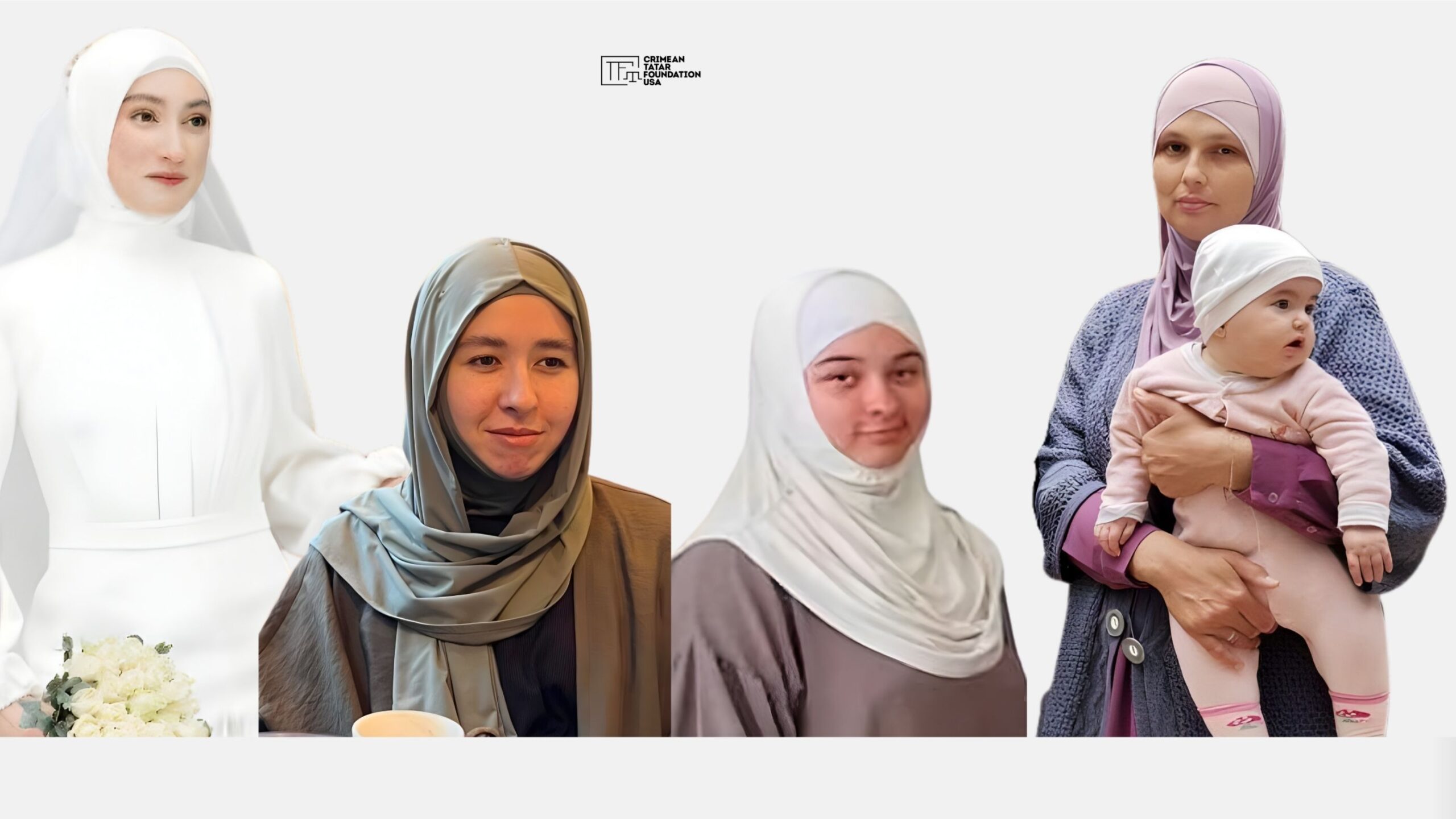
Russian occupation have reached a historic high, creating unprecedented risks and suffering for Crimean Tatar women and girls.
These arrests violate specific provisions of international law. Under Article 27 of the Fourth Geneva Convention, “Women shall be especially protected against any attack on their honour.” The deployment of armed forces against unarmed women in their homes constitutes what international legal experts classify as a grave breach—a war crime. Article 49 prohibits forcible transfers of protected persons, while Article 3 of the European Convention on Human Rights explicitly bans torture and inhuman treatment. Legal scholars note that threatening to separate mothers from children constitutes psychological torture under established European Court of Human Rights precedent.
The detentions were carried out without observing procedural norms: the detainees were not provided access to lawyers, their mobile phones were confiscated, the searches were conducted in the presence of (hired) witnesses without verified backgrounds, and minor children were subjected to psychological violence, becoming witnesses to armed violence in their own homes.
“The pattern of systematically targeting an autochtonous nation’s family structure – imprisoning fathers, then arresting mothers, threatening children – meets the legal threshold for genocide under Article II(c) of the Genocide Convention,” said Dr.Kriegsman, a human rights lawyer specializing in genocide prevention. “This is textbook genocidal policy: deliberately inflicting on the group conditions of life calculated to bring about its physical destruction.”
The international community, including Amnesty International, Human Rights Watch, the European Court of Human Rights, and the UN Human Rights Commission, consistently condemns the persecution of Crimean Tatars in occupied Crimea as a systematic violation of fundamental rights and freedoms. The European Parliament has repeatedly adopted resolutions demanding the release of all Crimean Tatar prisoners of conscience, recognizing these cases as fabricated.
Targeted Destruction of a Nation Through the Breakdown of Families
Since 2014, following the occupation of Crimea, more than 260 Crimean Tatars – the indigenous people of Ukraine and the autochthonous nation of Crimea – have been convicted on fabricated terrorism charges. Fathers, sons, brothers – all prisoners of conscience – are. They are sentenced to draconian terms ranging from 12 to 20 years of imprisonment and sent to serve their sentences thousands of kilometers away from their families, in strict regime colonies on the territory of Russia, up to 5,000 kilometers from Crimea.
The numbers reveal a deliberate pattern. Crimean Tatars constitute approximately 12-15% of Crimea’s population but account for 85% of political prisoners—a disproportionality that human rights organizations describe as systematic targeting. The average distance from Crimea to these prisons is 2,800 kilometers. A single family visit costs between $800 and $1,200, while the average Crimean Tatar family earns roughly $400 per month. The mathematics of separation is the most families cannot afford to maintain contact with imprisoned loved ones.
This practice deliberately separates children from their parents, making visits physically and financially impossible for families. Children grow up without fathers, unable to embrace them, hear their voices in person, or receive parental support during critical moments of growing up.
Now the authorities have come for the mothers.
According to Article 2(e) of the UN Convention on the Prevention and Punishment of the Crime of Genocide, genocide includes “forcibly transferring children of the group to another group.” When Crimean Tatar children are deprived of both parents.
“This is not simply repression,” explained researcher Zarema Mustafaieva of Purdue University, author of “From Historical Erasure to Digital Weaponization: The Crimean Tatar Factor in Hybrid Information Warfare”. “What we’re witnessing in Crimea is a continuation of Soviet-era genocidal practices with updated methods. In 1921-23 they used starvation, in 1944, they used cattle cars and concentration camp. From 2014-2025, they use prisons and fabricated terrorism charges. The goal remains identical: eliminate the autochthonous Crimean Tatar presence from their homeland.”
At least five Crimean Tatar children now have both parents imprisoned – orphaned while their parents remain alive. Esma Nimetullaeva’s five children represent the human cost of this systematic policy. Their father has been imprisoned for years; their mother was arrested October 15. Who will help with homework? Who will attend parent-teacher conferences? Who will comfort them when they wake from nightmares?
Women — Guardians of the Nation
Throughout three historical Russian regimes – from the illegal occupation of the Crimean Khanate in 1783, the second illegal occupation of the Crimean Tatar National Republic in 1918, and the third occupation of Crimea since 2014 – it has been Crimean Tatar women who have carried on their shoulders the unbearable burden of preserving the nation.
During the AçlikQirim genocide of 1921-23, the Holodomor in Crimea in 1932-33, during the terror against Crimean Tatar intelligentsia in 1938, and during the Sürgün genocide of 1944, when the entire Crimean Tatar nation was forcibly expulsion hundreds of thousands of kilometers away in cattle cars, where 46.2 percent of Crimean nation was murdered. It was the women who buried children along the railroad tracks, breastfed the infants of mothers who had died, and sustained life in conditions designed for extermination (concentration camps).
When Crimean Tatars were forbidden to return to their homeland, Crimean Tatar women secretly taught children their native language, transmitted cultural traditions, cooked national dishes, sang lullabies in Crimean Tatar, preserving what the Soviet authorities tried to erase from history.
After returning to Crimea in the 1990s, when the nation was restoring its presence on its native Crimean land, literally building homes with their own hands on empty plots without electricity or water, women once again became the foundation of revival: they created schools, cultural centers, and community organizations. The main goal of Crimean Tatar families was to send their children to universities to make children’s life better than they had.
Now, under the new illegal occupation of Crimea, when men are mass-arrested and sent to distant colonies, women bear an unbearable burden. Crimean Tatar women single-handedly raise children, provide for families, fight for the release of husbands and sons, preserve cultural identity under pressure of assimilation, and simultaneously become the voice of their nation before the international community.
By arresting these women, the occupying authorities are attacking the very heart of Crimean Tatar nation – those who preserve the language, traditions, faith, and hope. This is not coincidence, this is Russian strategy – to break the last pillar of the nation, to deprive children not only of fathers but also of mothers, to destroy the very fabric of Crimean Tatars.
Four Lives Interrupted at Dawn
Among those detained was Esma Nimetullaeva – a mother of five children and the wife of prisoner of conscience Remzi Nimetullaev. Early in the morning, masked FSB officers loudly burst into her home, brutally frightening the children and seizing phones and even books. Esma has been raising five children alone for several years, fighting for her husband’s release and supporting other families of prisoners of conscience. Now her children are left without both parents.
“Last night we spent the whole evening calming little Alime,” shared Selime, Esma’s sister, her voice breaking. “She kept asking: ‘When will mama come back? Did they take her away like they took papa?'”
The question haunts the household. Five children—their father imprisoned thousands of kilometers away for years, their mother now arrested—wake each morning to a reality no child should face. There is no one to help with homework, no one to wipe away tears, no one to tuck them in at night.
In the neighboring village of Kholmovka, they came for Nasiba Saidova, a 19-year-old nursery school teacher and pedagogical college student who had recently married.
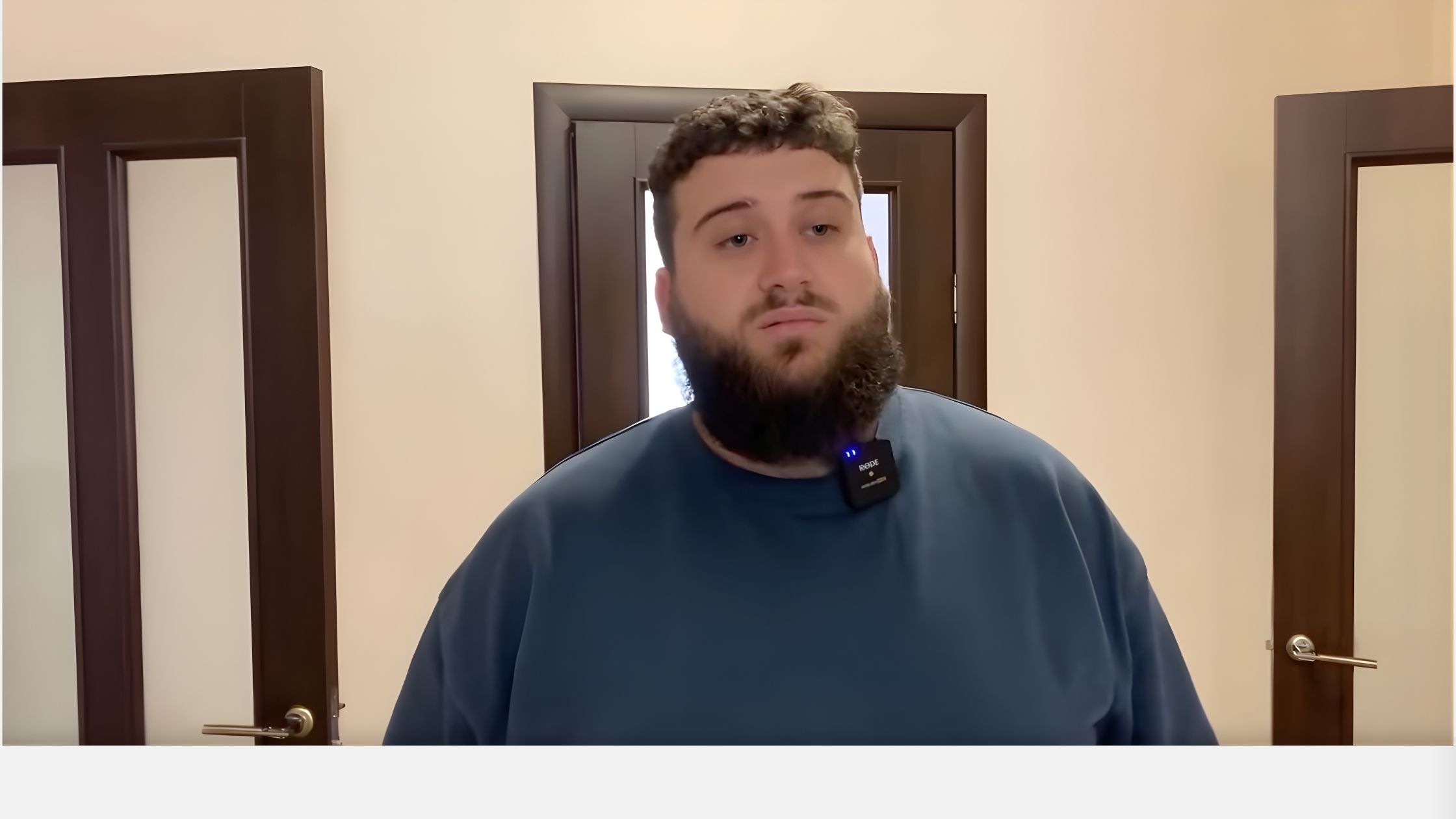
“The mothers couldn’t stop praising the new nursery group teacher, the children ran to kindergarten with joy every morning and didn’t want to leave. Nobody can believe she’s now behind bars.” – wrote activist and human rights defender Mumine Salieva on her social media.
In the village of Dolinnoye, a search was conducted at the home of Elviza Alieva, one of the top seven candidates for the master’s program at Crimean Federal University in Management.
“My Elviza was among the top seven candidates for the master’s program at CFU in Management,” her mother Elvira khanym recounted with both pride and pain.
Academic excellence, it seems, offers no protection. Elviza’s crime was not poor grades or violent acts – it was being Crimean Tatar while achieving success in occupied Crimea.
The fourth search took place in the village of Orlovka in the Sevastopol district, at the home of schoolgirl Fevzie Osmanova. Elyanora khanym showed the FSB officers the school certificate, pointing out that she is still a child.
Russian authorities were unmoved. Even childhood provides no sanctuary from this systematic persecution.
“Terrorism” Without Evidence
According to human right defender and lawyer Emil Kurbedinov, all four women face the same absurd charge: “organizing the activities of a terrorist organization.”
No weapons, explosives, prohibited materials, or plans to seize power were found during the searches. Instead, according to relatives, FSB officers “discovered” religious books, children’s textbooks, and personal gadgets.
“As I understand it, the FSB will petition specifically for all the women to be placed in pretrial detention,” Kurbedinov explained. “These cases are not justice – they are instruments of intimidation.”
Heavily armed forces stormed the homes of Crimean Tatar women who possessed no weapons, no ammunition, no plans to seize power – women who simply used their phones, read books on pedagogy and management, and told children stories about the prophets.
The Night Before Arrest
Just a few hours before arrest od Esma, she wrote to a friend the evening of October 14, asking about the health of an elderly woman who had been hospitalized with a stroke.
“What can I do? How can I help?” she wrote to her friend.
A few hours later, armed men burst into the home of this noble woman who had been thinking about how to help people.
“They did not even let her pray. <..> They told me: “You stay with grandchildren as grandmother, you can arrange guardianship for yourself”. They said that if there is no guardian, the state will be able to take children away. I answered that I would not give the children to anyone. Since they took their father [prisoner of coincidence Remzi Nimetulaev], I take care of my granddaughters myself. <..> [Then] I say: “Why are you doing that? While their parents are alive, you make children orphans. What did they [parents] do wrong? They practice their religion. What right do you have to treat us like this?”. In response, everyone remained silent, no one said a word”, - Aliye Bekirova said and added that she had felt bad after words about guardianship.
Citation from the NGO "Crimean Solidarity" Systematic Policy of Destruction
Such illegal operations have become routine in Crimea: systematic coordinated nighttime violent break-ins into Crimean Tatar family homes, planting of evidence, denial of access to lawyers, and propaganda videos labeling teachers and students as “terrorists.”
As journalist and human rights defender Mumine Saliyeva noted: “Statistically, there is now one prisoner of conscience for every thousand Crimean Tatars – more than two hundred sixty prisoners of conscience.”
The escalation is measurable. Russia is systematically expanding its targeting to include women, striking at the heart of family structures.
“When you imprison fathers, children lose guidance. When you imprison mothers, children lose their anchor,” explained Dr. Mbah. “This is deliberate. This is how you break not just individuals, but entire nations.”
In a healthy state, the police and law enforcement agencies to be guardians of the law, ensuring justice for every citizen. But what we witness in the footage of FSB operations in Crimea shatters these fundamental principles. Night raids, doors kicked down, blatant denial of legal counsel, and a blatant disregard for humanitarian norms and the rights of minor children – these have become horrifyingly commonplace. When so-called ‘witnesses’ with no verifiable background are involved in planting ‘evidence,’ and detainees, including educators and students, are publicly branded ‘women terrorists’ in press releases without proper procedural status, common sense is outraged. No rational individual could possibly deem such actions lawful,” wrote Mumine Saliyeva on her Facebook page.
Faith and Resilience
As night fell, the families of the detained lit candles and read prayers.
Homes where children’s laughter echoed just yesterday—gardens, gates, pomegranate trees, apple trees, morning birdsong, waves lapping at the shore—now stand empty.
But faith remains.
“Faith in the Almighty, His care, beautiful patience, our love, prayers and support are with them—because these things exist beyond bars and distances,” said a local imam of Crimea. “This is what makes you free, wherever you may be.”
For Crimean Tatars, these illegal arrests are not just another injustice, where under occupation kindness and compassion can be declared crimes, but also a signal that the nation has endured many times before.
But fear has not divided the people – on the contrary, it has brought them closer.
“We are united. Our empathy and passion consolidate us even more. No propaganda or lies will turn people against each other. Attempts to instill fear in the nation and distance it from prisoners of conscience, as well as their families and relatives, have not succeeded in this repressive laboratory.”
“Faith in the Almighty, beautiful patience, love, prayers and support remain with us – because these exist beyond bars and distances. This is what makes you free, wherever you may be,” wrote the civic organization Crimean Solidarity on its Facebook page.
The history of Crimean Tatars is a history of the incredible resilience of women who, through centuries of oppression, discrimination, repression and persecution, have preserved their nation and heritage. And this resilience is not broken. Even in the darkest night.
What Must Be Done
The choice is simple: act now, or watch another genocide unfold in real time.
Ukrainian Governments need to move fast.
Sanction the FSB officers who broke down these doors at dawn. Name them. Freeze their assets. Make it personal. File emergency petitions with the European Court of Human Rights. And join Canada, Lithuania, Latvia, and Poland in calling this what it is: genocide. Not “concerning developments.” Not “human rights violations.” Genocide.
International organizations need to stop issuing statements and start taking action.
The UN Special Rapporteur on the Rights of Indigenous Peoples should be demanding immediate access to Crimea. This is exactly what the mandate exists for – documenting genocide against indigenous populations. Francisco Cali Tzay needs to be raising this at every UN session, not filing reports that disappear into the bureaucracy. The UN Permanent Forum on Indigenous Issues should dedicate an emergency session to the systematic persecution of Crimean Tatars – the indigenous, autochthonous, state-forming nation of Crimea and Ukraine. Russia is attempting to eliminate an entire indigenous people from their ancestral homeland. If the UN’s indigenous rights mechanisms don’t act now, what are they for?
The European Parliament should pass an emergency resolution recognizing what this is: genocide against an indigenous nation. Not “human rights concerns.”
Not “persecution of minorities.” Genocide of the Crimean Tatar people—the indigenous people of Ukraine and autochthonous nation of Crimea. The European Parliament should pass an emergency resolution with teeth, not another toothless condemnation that Russia will ignore. And the International Criminal Court needs to move faster on its Crimea investigation. These women don’t have years to wait.
To journalists: tell their stories. Esma isn’t a statistic – she’s a mother of five who was thinking about how to help others the night before armed men burst through her door. Nasiba isn’t a case number – she’s the kindergarten teacher whose students ran to greet her every morning. These women deserve the same in-depth profiles, the same front-page coverage, the same international attention that ukrainian activists/journalists/political prisoners etc. receive. And while you’re at it, ask why they don’t get that coverage. The double standard is the story.
Don’t just report the arrests. Follow what happens next. Show up at the trials. Interview the families. Track where these women end up – usually thousands of kilometers away in colonies where their families can’t afford to visit. Explain to readers why this matters beyond Crimea. If Russia succeeds in eliminating an indigenous people of Ukraine through fabricated terrorism charges, that playbook gets used elsewhere.
If you’re reading this, you can do something today.
Share these names on social media. Write to your elected representatives and ask what they’re doing about Esma, Nasiba, Elviza, and Fevzie. If you can, donate to the Crimean Tatar Foundation USA, the Crimean Tatar Resource Center or to legal defense funds. Talk to people about this. Most have no idea it’s happening. Your aunt, your coworker, your neighbor – they’re scrolling past celebrity gossip while mothers are being torn from their children in predawn raids.
Yes, documentation matters. Every name is being recorded. Every FSB officer identified. Every prosecutor noted. There are precedents – Nuremberg didn’t happen overnight, but it happened. The Yugoslav tribunal took years, but war criminals ended up in The Hague. ICC warrants are out for Russian officials right now.
But here’s the thing about justice – it’s cold comfort to a five-year-old asking when mama is coming home. It doesn’t help the kindergarten kids who lost their favorite teacher. It won’t give back the years to a young woman imprisoned for the crime of being Crimean Tatar.
The world is watching. We’ve always been watching. We watched Rwanda. We watched Srebrenica. We watched the Rohingya. We watch, we document, we promise “never again,” and then we watch some more.
The question isn’t whether the world is watching. It’s whether anyone with power gives enough of a damn to actually do something about it.
Related Reading
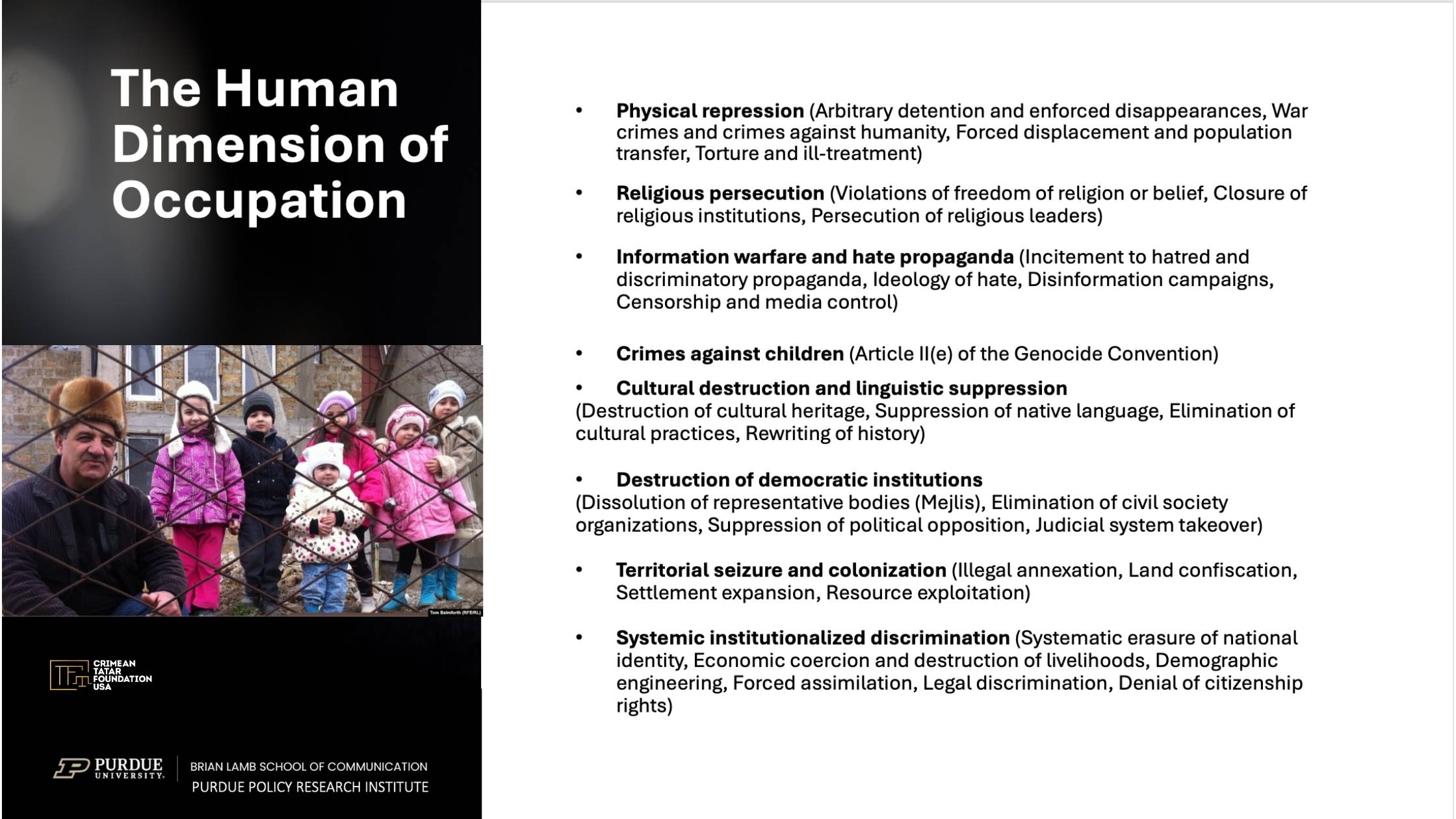
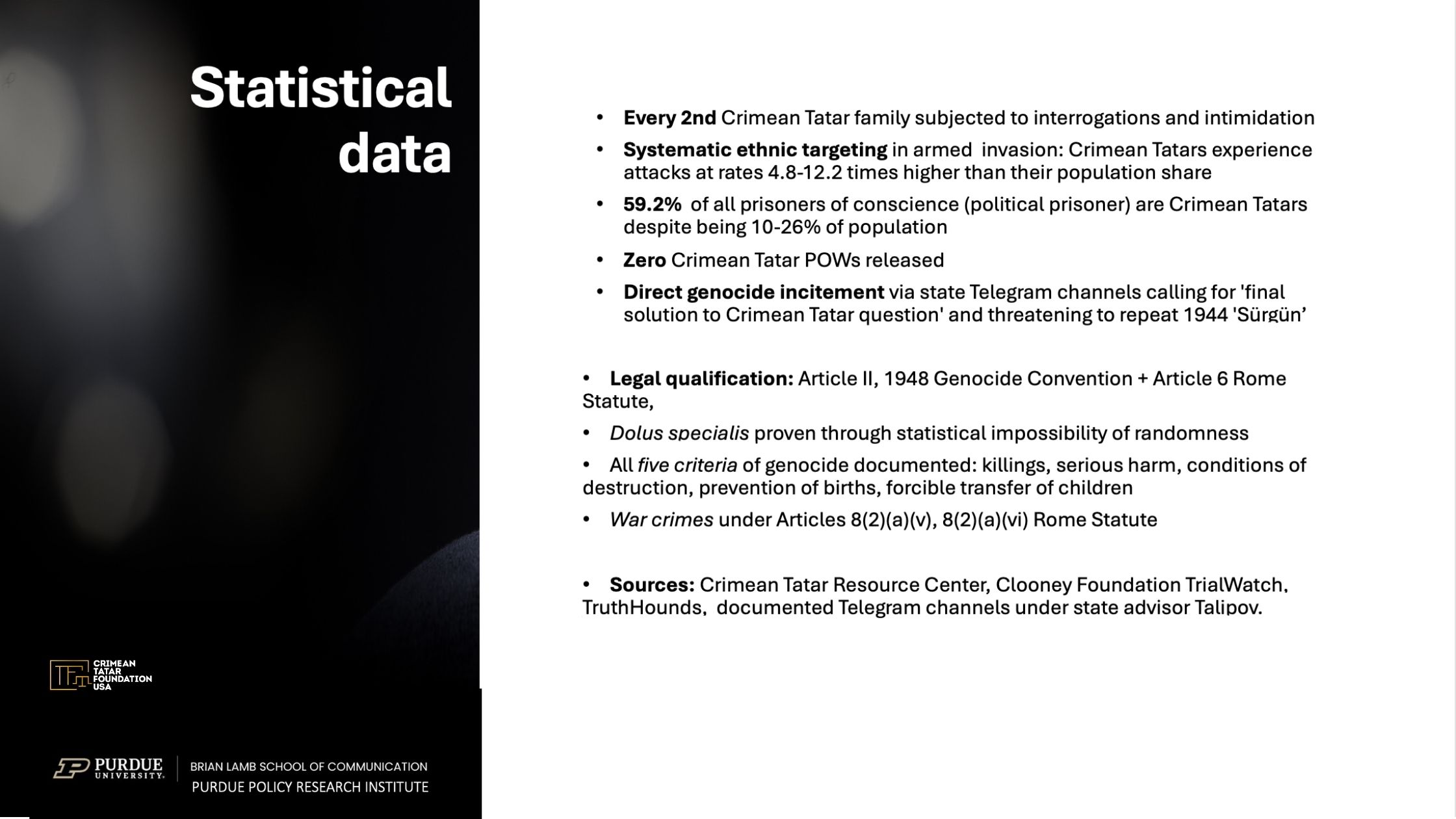
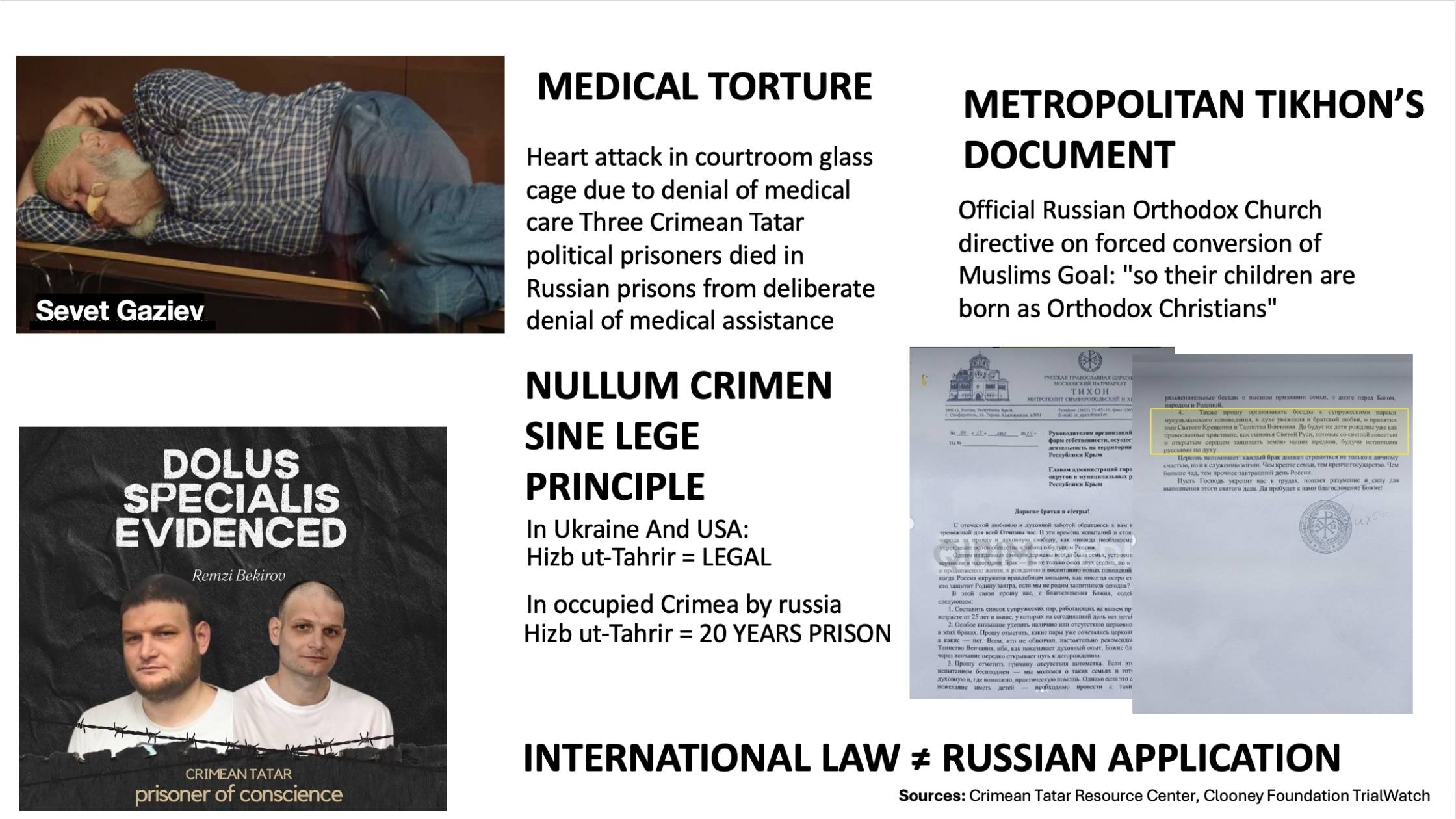
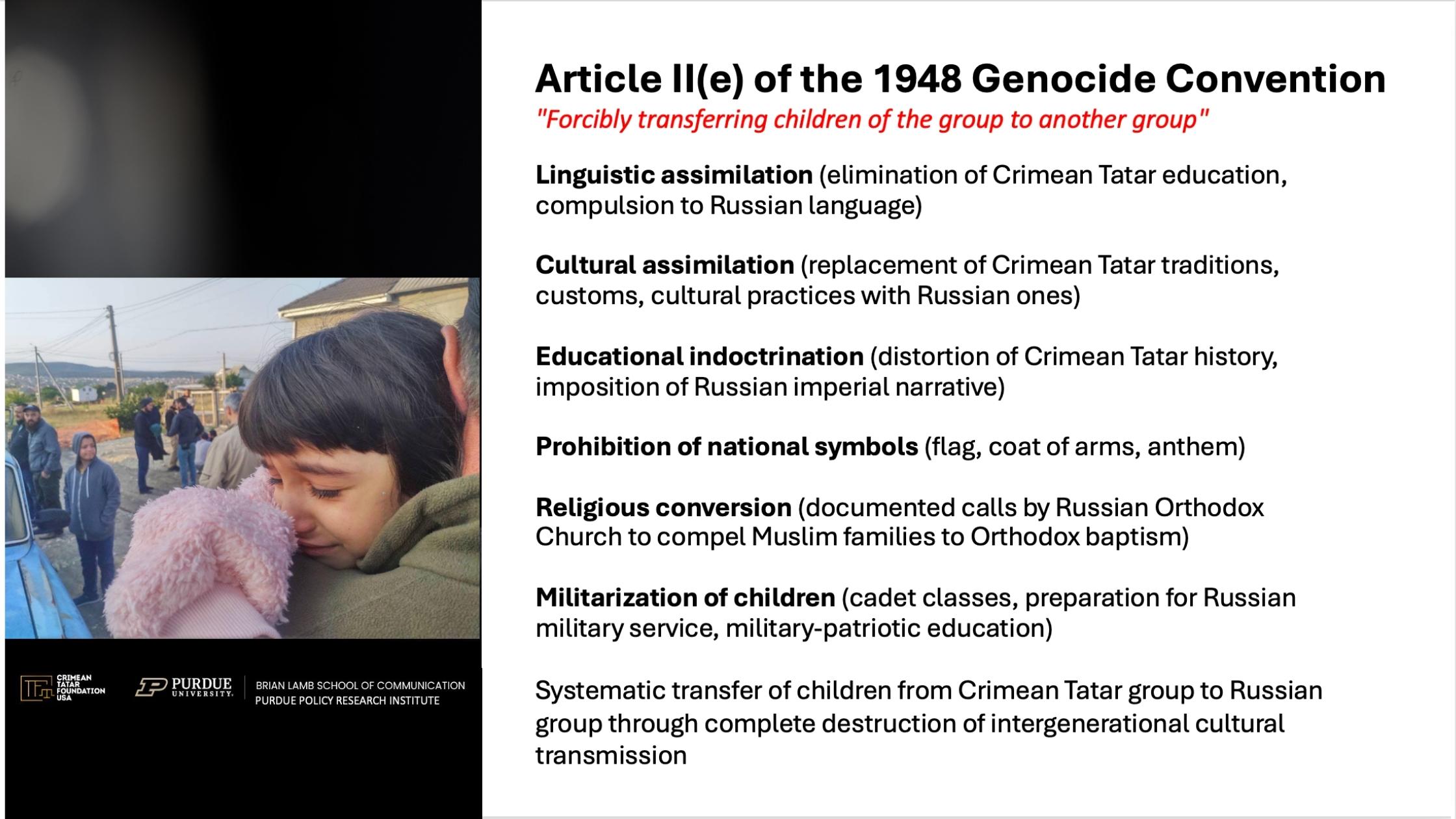
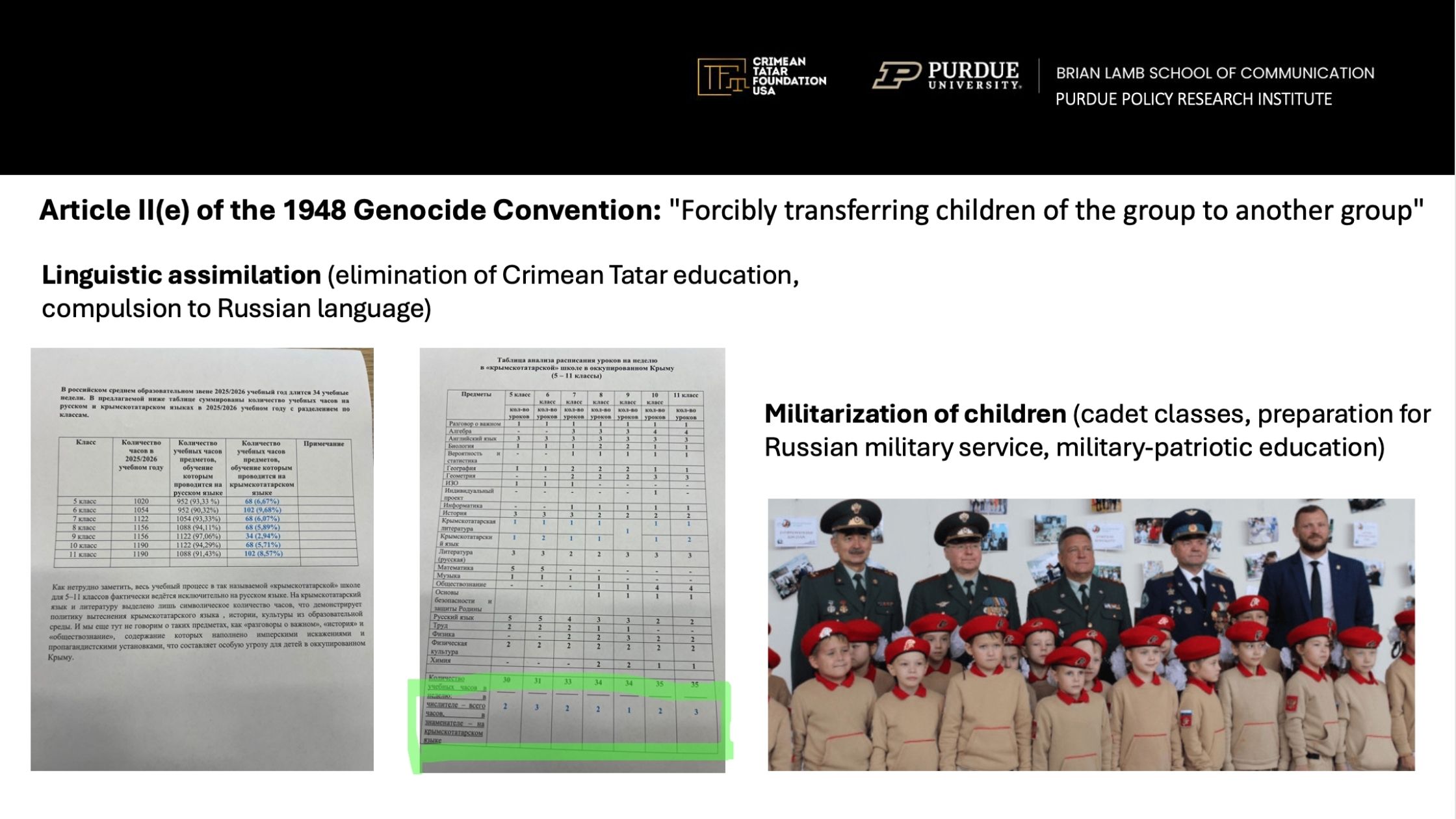
Documented Incitement to Genocide
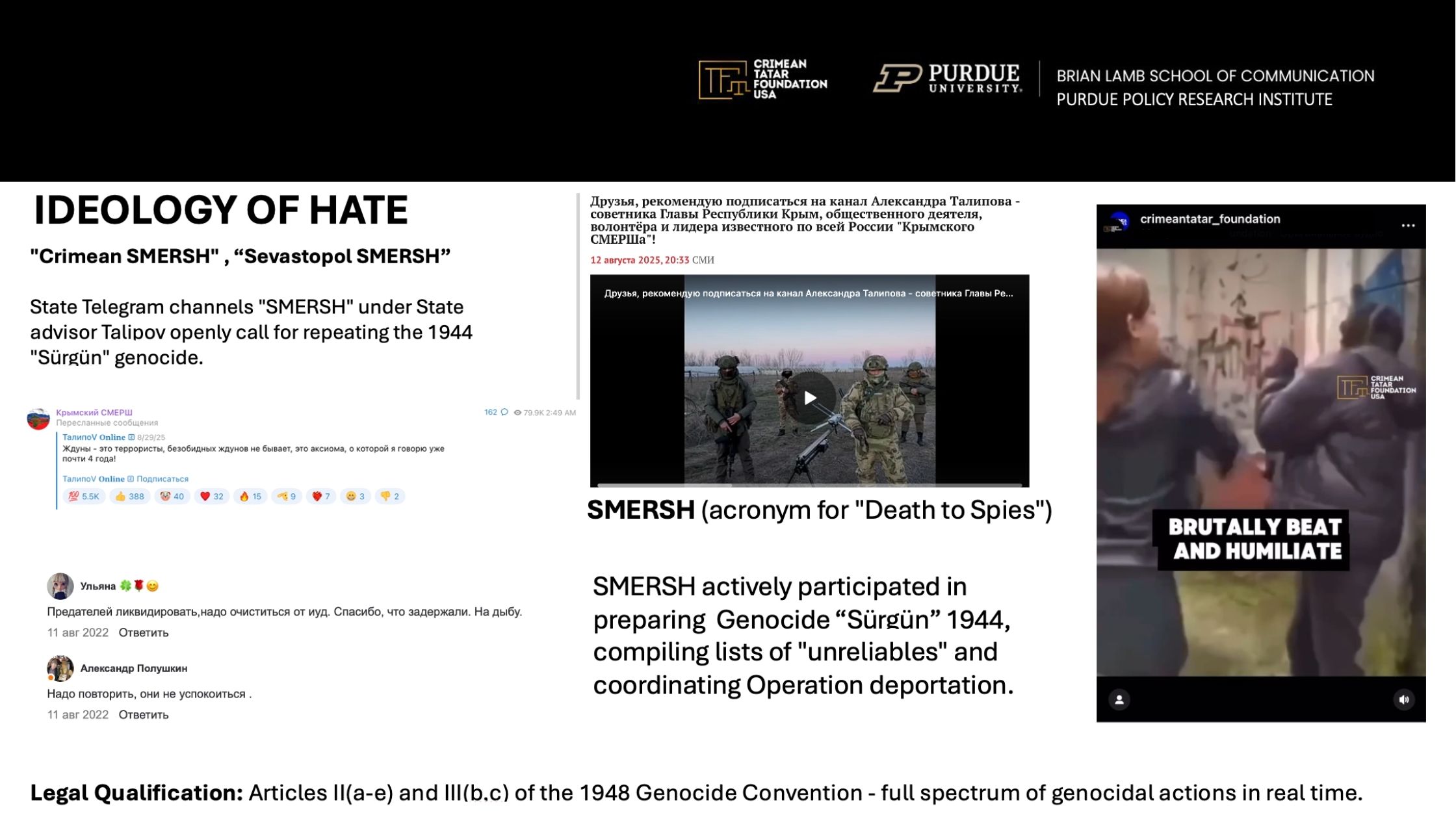
Systematic dissemination of information through Russian state social media platforms has been documented, particularly through Telegram channels “SMERSH Sevastopol” and “Crimean SMERSH” under the leadership of Alexander Talipov, state advisor to the head of the Crimean occupation administration. These platforms spread direct calls for genocide against Crimean Tatars, including threats of physical extermination and forced expulsion from their ancestral land, referencing a repetition of the 1944 “Sürgün” genocide.
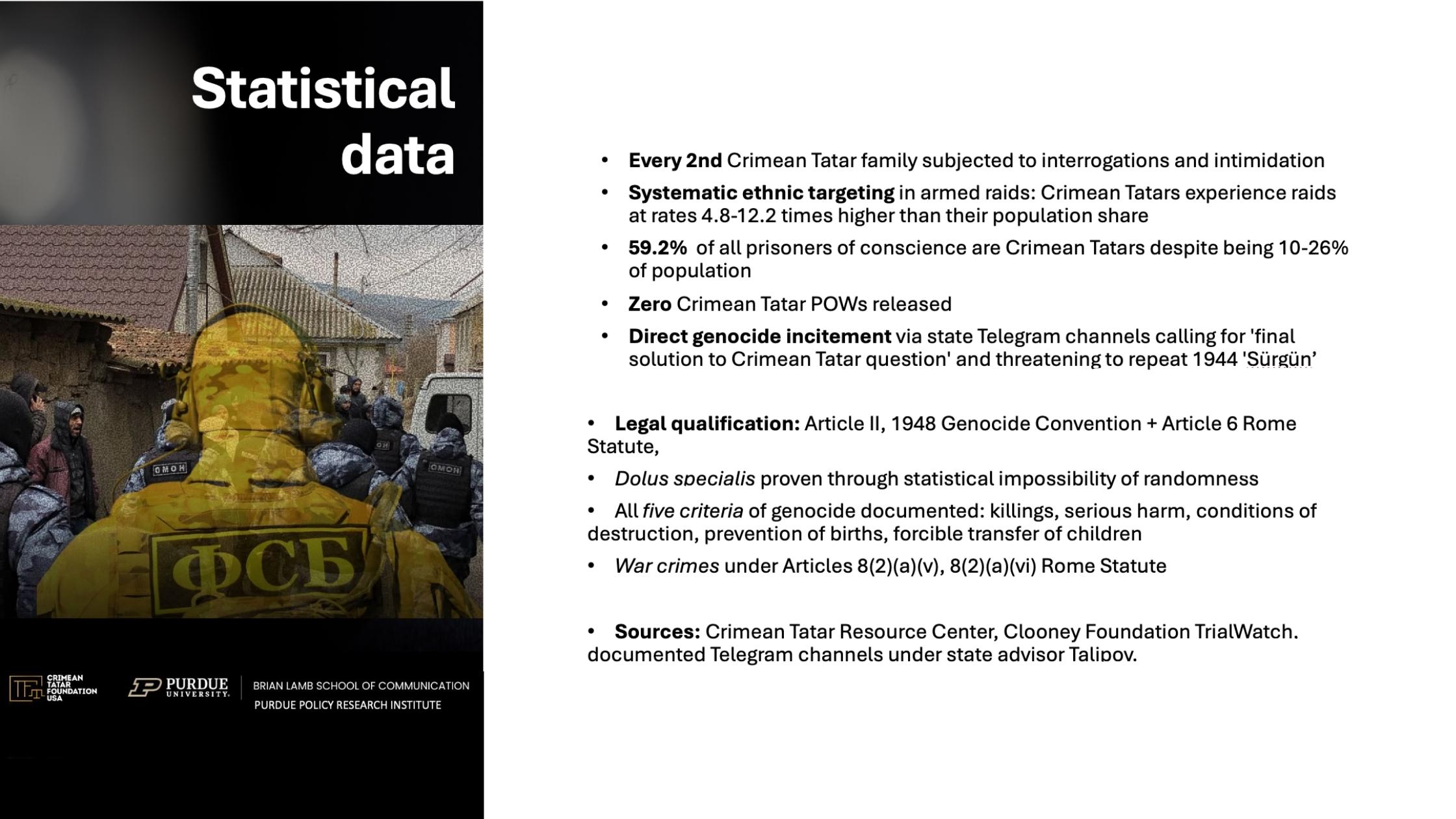
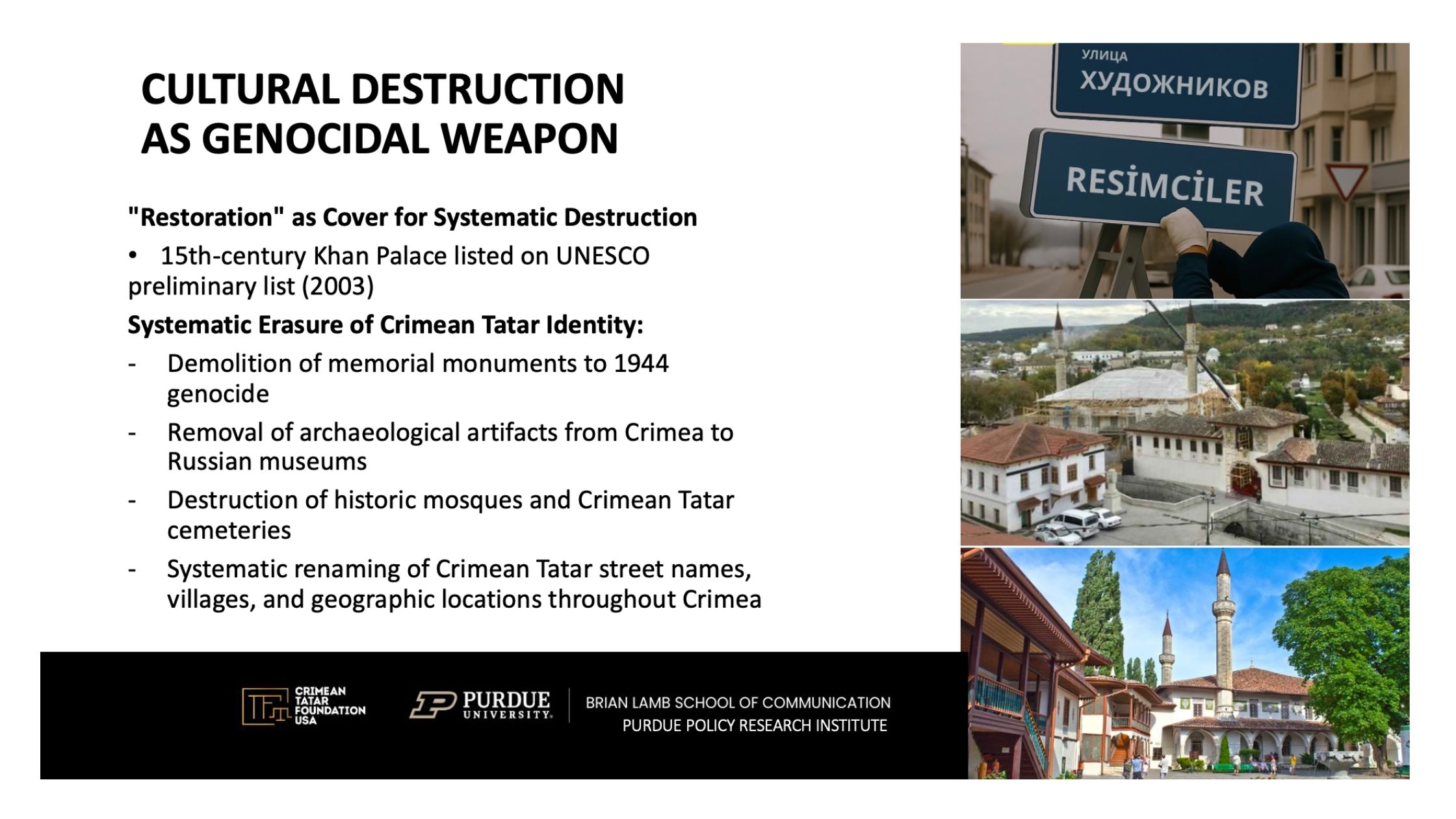
Ukraine must declare before the world: on the territory of the Crimean Peninsula exists a self-determined Crimean Tatar nation who is experiencing genocide under Russian occupation.